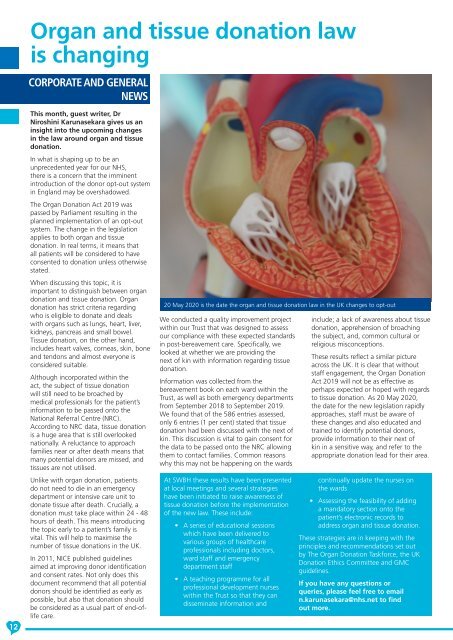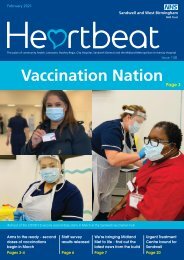Heartbeat March 2020
You also want an ePaper? Increase the reach of your titles
YUMPU automatically turns print PDFs into web optimized ePapers that Google loves.
Organ and tissue donation law<br />
is changing<br />
CORPORATE AND GENERAL<br />
NEWS<br />
12<br />
This month, guest writer, Dr<br />
Niroshini Karunasekara gives us an<br />
insight into the upcoming changes<br />
in the law around organ and tissue<br />
donation.<br />
In what is shaping up to be an<br />
unprecedented year for our NHS,<br />
there is a concern that the imminent<br />
introduction of the donor opt-out system<br />
in England may be overshadowed.<br />
The Organ Donation Act 2019 was<br />
passed by Parliament resulting in the<br />
planned implementation of an opt-out<br />
system. The change in the legislation<br />
applies to both organ and tissue<br />
donation. In real terms, it means that<br />
all patients will be considered to have<br />
consented to donation unless otherwise<br />
stated.<br />
When discussing this topic, it is<br />
important to distinguish between organ<br />
donation and tissue donation. Organ<br />
donation has strict criteria regarding<br />
who is eligible to donate and deals<br />
with organs such as lungs, heart, liver,<br />
kidneys, pancreas and small bowel.<br />
Tissue donation, on the other hand,<br />
includes heart valves, corneas, skin, bone<br />
and tendons and almost everyone is<br />
considered suitable.<br />
Although incorporated within the<br />
act, the subject of tissue donation<br />
will still need to be broached by<br />
medical professionals for the patient’s<br />
information to be passed onto the<br />
National Referral Centre (NRC).<br />
According to NRC data, tissue donation<br />
is a huge area that is still overlooked<br />
nationally. A reluctance to approach<br />
families near or after death means that<br />
many potential donors are missed, and<br />
tissues are not utilised.<br />
Unlike with organ donation, patients<br />
do not need to die in an emergency<br />
department or intensive care unit to<br />
donate tissue after death. Crucially, a<br />
donation must take place within 24 - 48<br />
hours of death. This means introducing<br />
the topic early to a patient’s family is<br />
vital. This will help to maximise the<br />
number of tissue donations in the UK.<br />
In 2011, NICE published guidelines<br />
aimed at improving donor identification<br />
and consent rates. Not only does this<br />
document recommend that all potential<br />
donors should be identified as early as<br />
possible, but also that donation should<br />
be considered as a usual part of end-oflife<br />
care.<br />
20 May <strong>2020</strong> is the date the organ and tissue donation law in the UK changes to opt-out<br />
We conducted a quality improvement project<br />
within our Trust that was designed to assess<br />
our compliance with these expected standards<br />
in post-bereavement care. Specifically, we<br />
looked at whether we are providing the<br />
next of kin with information regarding tissue<br />
donation.<br />
Information was collected from the<br />
bereavement book on each ward within the<br />
Trust, as well as both emergency departments<br />
from September 2018 to September 2019.<br />
We found that of the 586 entries assessed,<br />
only 6 entries (1 per cent) stated that tissue<br />
donation had been discussed with the next of<br />
kin. This discussion is vital to gain consent for<br />
the data to be passed onto the NRC allowing<br />
them to contact families. Common reasons<br />
why this may not be happening on the wards<br />
At SWBH these results have been presented<br />
at local meetings and several strategies<br />
have been initiated to raise awareness of<br />
tissue donation before the implementation<br />
of the new law. These include:<br />
• A series of educational sessions<br />
which have been delivered to<br />
various groups of healthcare<br />
professionals including doctors,<br />
ward staff and emergency<br />
department staff<br />
• A teaching programme for all<br />
professional development nurses<br />
within the Trust so that they can<br />
disseminate information and<br />
include; a lack of awareness about tissue<br />
donation, apprehension of broaching<br />
the subject, and, common cultural or<br />
religious misconceptions.<br />
These results reflect a similar picture<br />
across the UK. It is clear that without<br />
staff engagement, the Organ Donation<br />
Act 2019 will not be as effective as<br />
perhaps expected or hoped with regards<br />
to tissue donation. As 20 May <strong>2020</strong>,<br />
the date for the new legislation rapidly<br />
approaches, staff must be aware of<br />
these changes and also educated and<br />
trained to identify potential donors,<br />
provide information to their next of<br />
kin in a sensitive way, and refer to the<br />
appropriate donation lead for their area.<br />
continually update the nurses on<br />
the wards<br />
• Assessing the feasibility of adding<br />
a mandatory section onto the<br />
patient’s electronic records to<br />
address organ and tissue donation.<br />
These strategies are in keeping with the<br />
principles and recommendations set out<br />
by The Organ Donation Taskforce, the UK<br />
Donation Ethics Committee and GMC<br />
guidelines.<br />
If you have any questions or<br />
queries, please feel free to email<br />
n.karunasekara@nhs.net to find<br />
out more.


















